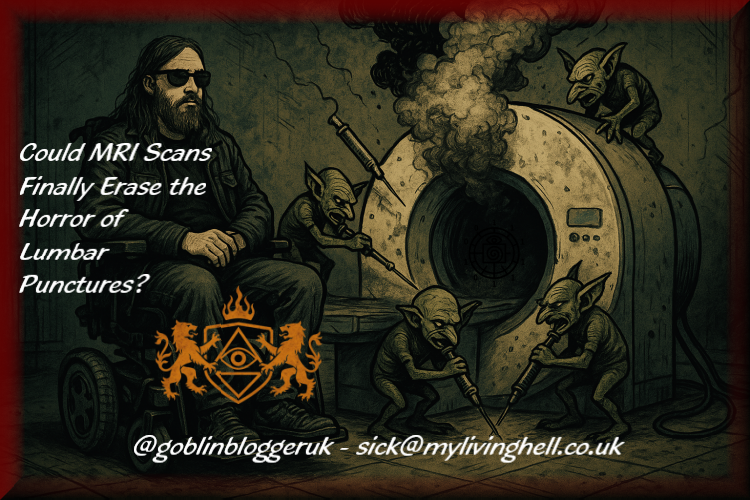- Posted on
⚠️ Please read with care: This blog shares personal, sometimes painful experiences. My intention is to support and speak honestly not to harm. I’m not a professional, just someone who understands how hard it can get. If you're struggling, you're not alone please reach out for professional help.
I’ve had two lumbar punctures. Maybe three. Honestly, the trauma fogs it.
But I remember the pain. I remember the fear. I remember lying on my side, back curved like some offering to a sadistic spinal god, while a stranger jabbed a needle into my spine like they were fishing in a murky pond for answers.
It was the closest I’ve ever come to hoping I was dying. Not out of melodrama out of mercy.
Because let’s be honest: lumbar punctures are fooking horrific.** No one talks about it. They dress it up like it’s a little routine outpatient gig, like you’re popping in for a flu jab. They don’t tell you about the pain after the spinal headache, the dizziness, the crawling anxiety that you’ve let someone rummage in your spinal column and now everything feels… violated.
Enter the new hope: MRI.
Apparently, researchers at the University of Nottingham have developed an MRI-based technique — using something called a T2-weighted scan* that looks for veins running through lesions (the “central vein sign”) using the so-called Rule of Six:
If six or more brain lesions have a vein running through them, there’s a high chance it’s MS.
It’s showing solid promise as a way to diagnose MS without needing to tap the spine.
Cue the heavenly choir of spinal survivors.
This method isn’t just easier it’s gentler. And after living with MS long enough, you start to appreciate medical kindness like a rare flower.
What does this actually mean?
No spinal tap for some people = less trauma, less pain, less fear.
Diagnoses could come 3 months earlier in many cases.
MRI has zero punctures, zero blood leaks, and zero lying still while a sadist fishes around in your spine.
Oh, and most patients prefer MRIs. Shocking, I know. (Source: Multiple Sclerosis News Today, MS Society UK, ScienceDaily.)
But of course… it’s not perfect.
Let’s not kid ourselves. There are caveats:
Not every hospital has the fancy T2* MRI machines.
Some docs still worship the spinal tap as gold standard.
False positives happen.
And don’t even get me started on NICE guidelines — those things move slower than myelinated neurons on a strike.
Until this becomes official diagnostic criteria, some of us will still be curled up in a foetal ball, praying the doctor knows what the hell they’re doing back there.
From someone who’s had “just two” lumbar punctures…
Let me say this: Even one is too many. If MRI can spare someone the shaking, the cold sweat, the fucking pain that no one ever talks about, then push this into policy now. Not in five years. Now.
Because for some of us, the spinal tap wasn't a diagnosis. It was a trauma. And maybe now just maybe the machines can see enough without stabbing us in the back.
I write in ink and fury, in breath and broken bone.
Through storm and silence, I survive. That is the crime and the miracle.

